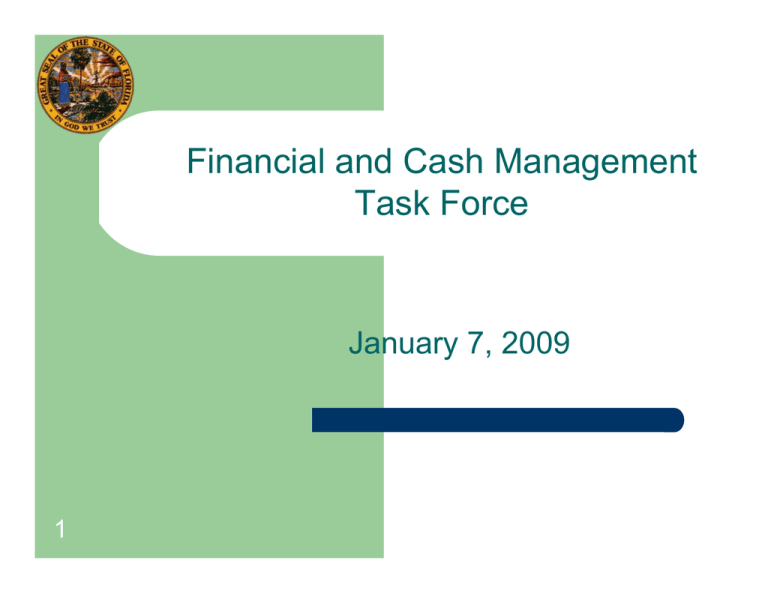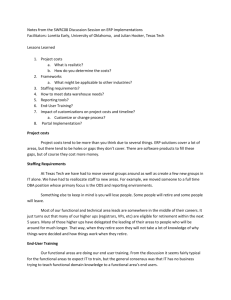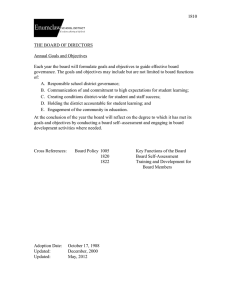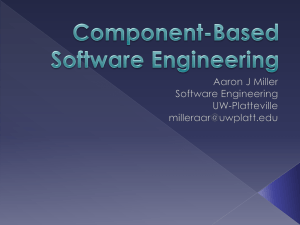Financial and Cash Management Task Force January 7, 2009 1
advertisement

Financial and Cash Management Task Force January 7, 2009 1 Agenda z z z z z 22 Review Revised Funding Options Document (requires Task Force approval) Business Process and Requirements Analysis Presentation Comments on Enterprise Project Governance Guest Speaker – Project Governance Review Meeting Schedule Recommended Funding Options Revisions 3 Recommended Funding Options Revisions Section 1.2.1 Funding Option #1 – General Revenue z Removed the example showing the potential increase in the General Revenue service charge z Added the “need to evaluate the trust funds ability to support the fee increase” as a concern Section 1.2.2 Funding Option #2 – Internal Service TF z Provided suggestions on cost sharing methodologies that could be implemented for the usage fee: – – 44 – # of transactions processed # of payments issued # of FTEs for Agency Recommended Funding Options Revisions Section 1.2.3 Funding Option # 3 – Federal Grants z Section deleted and moved to the Other Considerations portion of the document Section 1.3.2 Federal Grant Funds z New section inserted to address Federal grants as a potential approach to cover a portion of the implementation costs Section 1.4 Task Force Funding Recommendation z New section stating that funding option 2 is being recommended by the Task Force 55 Business Process and Requirements Analysis 6 Business Process and Requirements Analysis Purpose z Identify challenges from Project Aspire to standardize business processes and requirements z Review each customization from Project Aspire and catalog the “cause” for customizing z Provide meaningful information to minimize the number of customizations in future projects 77 Business Process and Requirements Analysis Functional Team reviewed: z Functional Requirements z Business Process Flow Diagrams z Customizations to Software 88 Business Process and Requirements Analysis Functional Requirements z DFS, with assistance from Maximus Consulting, developed functional requirements that encapsulated enterprise resource planning technology z Included input from the 33 state agencies z 1,110 functional requirements used for the selection of software z 70 requirements added during the Project’s requirements confirmation and design phases 99 1,180 Total State Functional Requirements # Primary Functional Area # Primary Functional Area 62 Asset Management 205 Procurement Accounting 27 Budget Control/Execution 48 Project Accounting 23 Cash Management/Agencies 3 Revenue Accounting/ Management 73 Cash Management/Treasury 71 Software 124 System 28 Travel 3 Requirements added during ITN 61 Requirements added during Requirement Confirmation 6 Requirements added during Design 52 Data Classification 50 Data Warehousing/ Decision Support 206 Financial Accounting/ Management 10 64 Grant Accounting 23 Inventory Management 51 Procurement Business Process and Requirements Analysis Business Process Flow Diagrams z Project Aspire in collaboration with state agencies identified business processes z Incorporated both processes inherent in the software and customizations to meet the State’s functional and business processing requirements z Business Process Design document outlined 6 core business functions and provided 221 process flow diagrams associated with the core business functions 11 11 221 Total State Business Process Flows Number Of Process Flows 28 Accounts Receivable & Billing 13 Asset Management 25 Project & Grant Management 51 Procurement to Payment 51 Recording to Reporting 45 Treasury Functions 8 Flows that cross functional areas 221 12 Core Business Function TOTAL Business Process and Requirements Analysis Customizations z Each customization captured in a functional specification document z Each functional specification was – – – z 13 13 categorized as an enhancement, interface, or report assigned a number added to the Application Design Master List (ADML) Project’s final ADML had a total of 280 approved customizations 280 Total State Customizations Total 14 Enhancement Interface Report Core Business Function 18 11 4 3 Accounts Receivable & Billing 14 11 2 1 Asset Management 25 12 8 5 Project & Grant Management 109 37 48 24 Procurement to Payment 64 20 26 18 Recording to Reporting 39 16 12 11 Treasury Functions 11 7 4 0 Technical and Misc 280 114 104 62 TOTAL CUSTOMIZATIONS Business Process and Requirements Analysis Analysis Tool z z z z z 15 15 Aspire developed a matrix that identified relationships in Business Processes, Functional Requirements and customizations Information loaded to a newly created analysis database Business processes were logically connected to the customizations No logical connection of the functional requirements to the customizations Functional Team reviewed each of the 1,180 functional requirements and linked only the requirements that resulted in a customization to the software Business Process and Requirements Analysis Methodology z z z z 16 16 Reviewed each customization in accordance with seven drivers to determine the causes for software customizations Database allowed the selection of multiple drivers However, only one driver could be selected as a “primary driver” Primary driver is the one driver that overwhelmingly caused the customization Business Process and Requirements Analysis Primary Drivers z z z 17 17 State Legal Requirement: the State Constitution, Florida Statute or the Florida Administrative Code had to specifically require the action Federal Legal Requirement: the U.S. Constitution, U.S. Code or the Code of Federal Regulations had to specifically require the action Florida Financial Management Information Systems (FFMIS): requirement of one of five subsystems listed in Section 215.93 F.S. Business Process and Requirements Analysis Primary Drivers z z z 18 18 State Agency Need: at least one state agency had a business need that was not in the functionality of the delivered software Enterprise Need: the CFO and/or state agencies collectively had business needs that were not included in the functionality of the delivered software Replicating Existing Functionality: there was a business need that was not being met in functionality of the delivered software and alternative processes could not accomplish the same results Business Process and Requirements Analysis Primary Drivers z 19 19 Other:– these drivers were included when certain aspects of the delivered software were limited in accomplishing prescribed tasks; only the system limitation could be a primary driver Business Process and Requirements Analysis Results z z 20 20 Top Three Drivers for Customization – Replicating existing functionality – FFMIS – Enterprise need Top Three Core Functions with Customization – Procurement to Payment – Record to Report – Treasury Business Process and Requirements Analysis Results Agency Need 0 4 9 2 1 Accounts Receivable & Billing 14 5 0 2 2 1 2 2 Asset Management 25 2 8 0 4 6 3 2 Project & Grant Management 109 5 2 21 9 8 57 7 Procurement to Payment 64 5 3 18 6 7 23 2 Recording to Reporting 39 1 0 13 0 12 11 2 Treasury Functions 11 0 0 1 1 1 4 4 Technical 280 20 13 55 26 44 102 Other FFMIS 0 Replicating Existing Functionality Federal Law 21 21 Enterprise Need State Law 2 Total 18 Driver of Customization 20 TOTAL CUSTOMIZATIONS Business Process and Requirements Analysis Recommendation z Focus on Reengineering the State’s processes for z z z z 22 22 Procurement to Payment Record to Report Treasury Hire consultants with reengineering expertise and proven methodologies Business Process and Requirements Analysis Questions? 23 Comments on Enterprise Project Governance 24 25 Comments on Enterprise Project Governance z Insert “Financial” into titles: – – z z Need to define scope for Enterprise Financial Project Governance Need to define the role of the Enterprise Financial Business Operations Officer – 26 26 Enterprise Financial Governance Structure Enterprise Financial Project Governance Structure – Should the officer be the Project Director? Should the officer be the Project Sponsor? Comments on Enterprise Project Governance z Need to define the role of the Enterprise Financial Council vs. the Project Steering Committee – – z 27 27 Is it the same group of people? What is the difference in responsibilities? Should the Project Director and Project Manager be different roles or can these roles be handled by one individual? Comments on Enterprise Project Governance z z 28 28 Invited two guest speakers to discuss the current industry practices Revisions will be made and presented to the Task Force on January 24th for final approval Guest Speaker Project Governance 29 Task Force Meeting Schedule 30 Task Force Meeting Schedule z z z 31 31 January 14, 2009, 3:00 P.M. to 5:00 P.M. January 23, 2009, 10:00 A.M. to 12:00 P.M. January 28, 2009, 1:00 P.M. to 3:00 P.M. Financial and Cash Management Task Force Adjourn 32




